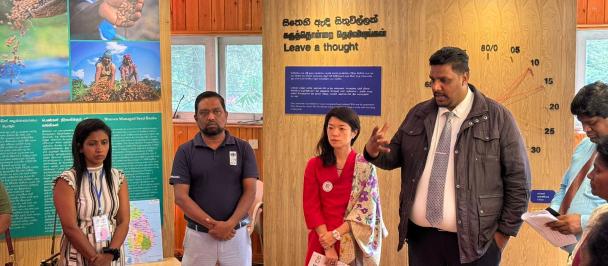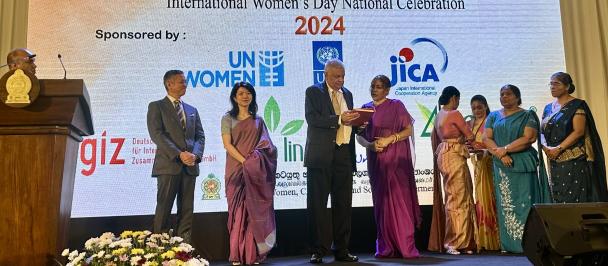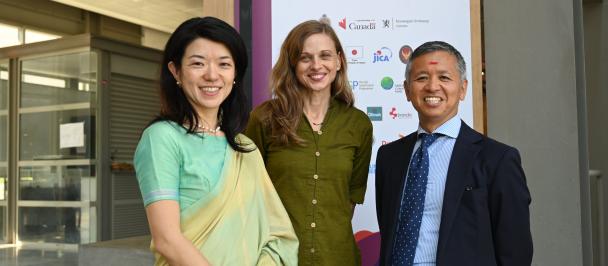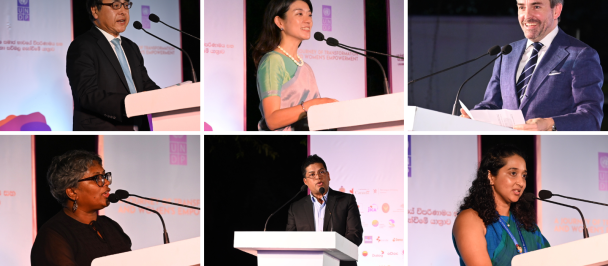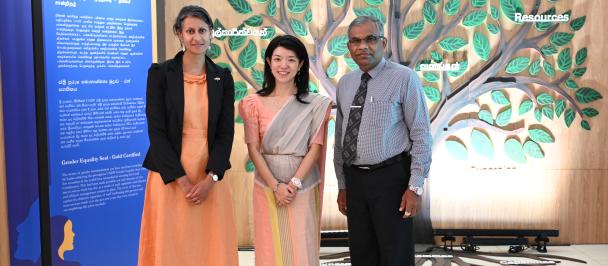Panelist remarks by Deputy Resident Representative in Sri Lanka
16th National Convention on Women's Studies - Panel discussion
November 26, 2021
Ms. Malin Herwig, Deputy Resident Representative, UNDP in Sri Lanka
*Check against delivery
Gender Inclusive Governance: Increasing Women’s Voice and Representation.
· Women in Sri Lanka have historically culturally held roles of significance and importance in society, beginning with the basic unit of society-the family. In fact, history reveals that there has been a fair gender balance in the country, with Sri Lankan women enjoying a high degree of equality, visibility and decision making in the home and in society.
· Since independence, Sri Lanka have endeavored to redress gender inequality by joining with the efforts of the international community.
· However, over the past 10 years, it has been observed that Sri Lanka’s gender equality indicators have declined.
· In 2006, the year in which the Global Gender Gap Index (GGGI) was introduced, Sri Lanka ranked 13 out of 115 countries. However, in the latest edition of the report in 2021, Sri Lanka was ranked at 116, making it one of the countries with the largest decline.
· Sri Lanka has performed poorly relative to its South Asian peers ESPECIALLY in terms of two main indicators which are being concerned to calculate the GGGI i.e Economic participation and political empowerment.
· While the country scores high on the Human Development Index which signifies women’s equitable access in the areas of education and health, when it comes to engagement in economic and political sphere, women and girls in the country face many structural, cultural and attitudinal barriers.
· Women’s representation and participation in governance is concerningly low, with only 5% of Sri Lankan women represented in Parliament, demonstrating the limited role women play in Governance, despite constituting 52% of the population.
· Sri Lanka remains in the bottom 10 countries that have lowest political representation of women at the national level (182 out of 192 countries measured by Inter-Parliamentary Union).
· The Covid-19 pandemic shed light on the vast constraints faced by women and girls in Sri Lanka, indicating their diminished voice and representation, and constraints in their ability to exercise economic, political and administrative authority over even their own lives:
o Increased gender-based violence –indicates reduced voice at home
o Gender-biased laws and norms that prevent them from making decisions about their own lives in their communities.
o Increased care burdens further reducing their time for productive employment and engagement in issues of broader governance in society.
· Despite the disparities highlighted above, certain gender related achievements need to be acknowledged, including the introduction of a mandatory 25% quota for women in local government, the launch of a National Action Plan to address Sexual and Gender Based Violence in 2016, the establishment of a Parliamentary Sectoral Oversight Committee on Women and Gender, and continued efforts to mainstream gender into national policy making.
· UNDP Sri Lanka’s flagship portfolio on SDG 16: Peace, justice and strong institutions identifies opportunities and entry points for lasting transformation and has accelerated action on advancing greater gender equality and female empowerment through support across all project interventions.
· UNDP Sri Lanka has made significant strides in preventing and responding to sexual and gender-based violence, these include recommending reforms to address the structural barriers at institutional level which limit women’s representation, and facilitating gender-sensitive service delivery across sectors while promoting women’s representation in Governance, at all levels.
1) Policy and Legislative changes: Women make up more than half of the Sri Lankan electorate, but they are under-represented in decision-making positions. Increasing women’s voice and political participation has clear and positive impacts on the quality of governance, transparency and accountability. In efforts to promote women's political participation through more meaningful engagement with women representatives UNDP’s works with the Gender and Women’s Select Committee in Parliament, addressing Discriminatory laws against women in relation to marriage and inheritance through the Sectoral Oversight Committee (SOC) on Women and Gender. UNDP has also supported gender inclusion within the Parliamentary Development Action Plan, acknowledging gender mainstreaming into Committee proceedings and legislative drafting processes and within the Code of Conduct for parliamentarians.
2) Institutional transformation: ground-breaking gender studies conducted upon the guidance of the National Police Commission with UNDP’s support, have succeeded in addressing structural gender inequalities within the Sri Lanka police force . Active engagement of female police officers is critical towards the promotion of gender sensitive dispensation of justice, public order management, community engagement and provision of female role models in rule-of-law enforcement. Through technical support UNDP contributed towards increasing gender sensitivity and reducing disparities of women representation in the Sri Lanka Police force through the implementation of key recommendations from a study titled “Achieving gender equality in the Sri Lanka Police Force”. The study brought to light some of the challenges women face in progressing up the ranks in the Sri Lanka Police Force, including a quota system which differentiates cadre on the basis of sex and minimum body height requirements for female police officers. Most importantly, the study made recommendations for the removal of all barriers precluding women from moving to the highest ranks in police force, thereby encouraging women and girls to advocate for their own rights and pursue careers in law enforcement. Successful advocacy efforts following the study also resulted in the allocation of a quota of female police officers to the Police Victims of Crime and Witnesses Protection Division.
3) UNDP also ensured the gender-sensitive dispensation of justice through ongoing support for access to justice among victims of SGBV, the operationalization of the Victim and Witness Protection Authority and the incorporation of gender considerations into the Victim and Witness Protection Law reform and implementation. In addition, to address the needs of vulnerable female clients during the court lockdown, UNDP facilitated for 12,000 indigent female clients reliant on monthly court-ordered maintenance to secure the government financial relief package.
4) Attitudinal Transformation: A “Women in Leadership” campaign was conducted on social media highlighting women leaders who have played a commendable role in effectively protecting the people of Sri Lanka in response to Covid-19. The campaign which celebrated female leaders including the Minister of Health, the Deputy Director General of Public Health Services, and medical staff received much traction on social media. This campaign served to promote gender equality; encourage more women to take up leadership roles by improving working conditions for women; involve women in all planning and development committees; improve accessibility to gender sensitive services, such as health, social and justice; and engage men to support women’s leadership.
5) Economic Independence and Resilience: UNDP also remains the largest development partner still supporting the resettlement of IDP’s and refugee returnees, as well as military and war widows by promoting economic resilience and independent livelihoods. UNDP continues to prioritize women-headed-households in providing relief and assistance packages to refugee and IDP families returning to resettled areas. Through a Joint Program with UN Women under the Gender and Peace Initiative, over 300 military and war widows across 3 districts (Kurunegala, Anuradhapura and Kilinochchi) have been empowered to start-up or strengthen existing businesses following trainings and provision of in-kind grants. The project also addressed challenges of sexual bribery and harassment frequently faced by military and war widows through a network of 63 women’s collectives and self-help groups established in collaboration with local CSOs.
6) Promoting Women’s Voice and Representation in local governance:
· UNDP’s Capacity Development of Local Governments (CDLG) Project focuses on strengthening local governance systems to be gender-sensitive, inclusive and accountable, and improve service delivery through the capacity development of local elected officials in the four target provinces of Eastern, North, North-Central and Uva.
· The project also pays specific attention to strengthening the role of women elected officials and promoting an enabling environment for active women’s political participation.
· The project has succeeded in increasing the active participation of women members of Local Authorities in community projects and increasing the number of women’s groups engaged in decision making processes by conducting trainings for elected and administrative officials of local government with ensured participation of female officials.
· Through a detailed project specific Gender Action Plan, the CDLG project has also increased the capacities of women officials participating in local decision-making processes by increasing the number of women groups/women leaders engaged in local level planning and budgeting and providing a diploma specifically catering to women leaders in the Uva Province linked to capacity development.
- In addition, the protection of military and war widows from sexual bribery and exploitation was facilitated through the drafting of anti-harassment committee guidelines for public institutions titled ‘Respectful Workplace Guidelines’ and Paralegal Training Modules formulated for public officials.
7) At the very Grassroots: Voice within the Community: UNDP also assists in the setting up and strengthening of Community Based Organizations (CBOs) which include female representation or are led by women especially in the conflict-affected North-East, where UNDP continues to facilitate the return of displaced families. This enables female leadership development and voice in governance issues relating to the immediate local village communities at the very grassroots level.
8) Voice for SGBV victims: UNDP recognizes that women’s voice and empowerment begins within the home. As such, UNDP is committed to providing women and girls with a safe space at home, free from harassment and violence, where their rights are equally respected. Providing SGBV victims with the support they need to achieve this, is a key priority.
o The multi-sectoral National Plan of Action to address SGBV, formulated and implemented by the Ministry of Women’s Affairs and Child Development with support from UNDP and other DPs, has promoted a coordinated approach to addressing GBV in the country and demonstrates the State’s commitment to put in place a national framework in its response to end violence against women and girls.
o COVID-19 lockdowns and travel restrictions imposed in Sri Lanka in 2020 resulted in the escalation of GBV due to victims being confined to their homes. In this context UNDP prioritized the protection to victims of SGBV through:
§ Technical support to update the National Shelter Guidelines which included incorporation of Covid-19 measures
§ Shelters’ emergency response to Covid 19 supported through assistance for food security and safety (including PPE provision).
§ A Covid-19 Assessment of SGBV including domestic violence using data from available helplines.
§ Public engagement and advocacy on addressing SGBV and awareness on available support services for SGBV survivors increased through a multitude of awareness campaigns and public engagement initiatives with wide outreach.
· Addressing violence against women means sharply scaling up engagement with men and boys. UNDP also continues to build on its strategic partnerships expanding its reach with non-conventional initiatives. This includes a collaboration with the Men Engage Alliance, a global network of NGOs working to advance gender justice, on addressing gender stereotypes triggering behavioral change among men and boys on gender equality.
· In addition, UNDP’s social innovations lab CITRA, engages youth in challenges which address cyber violence and SGBV among youth and young women. An innovative initiative on addressing cyber violence and SGBV among youth was conducted under UNDP’s Hack a Dev Challenge which resulted in the generation of creating thinking through the development of an App to address cyberviolence among young women and men. This initiative also underlines the vital role information and communication technology can play in amplifying women's voices, expanding their economic and learning opportunities, and broadening their views and aspirations.
In Closing
· Governance is broadly understood in the development sector as the exercise of authority or power in order to manage a country’s economic, political and administrative affairs.
· While Sri Lanka’s female demographic constitutes 52% of the population, comprehensive social development and economic gains for the country is not possible without ensuring equal roles for women in decision-making positions, within the economic, political and administrative sphere, at home, within their local communities, in local government, and at national law making/law enforcing levels.
· The COVID-19 outbreak has shed even greater light on the full extent of gender inequality and increased the urgency of fostering gender-inclusive approaches to harness sustainable peace.
· UNDP Sri Lanka is committed to ensuring women’s equal representation, to uphold women’s rights, promote women’s economic empowerment, address gender inequalities in employment and social protection systems, and to ensure women’s equal and meaningful participation in the formulation of policies, plans and decisions, which impact their lives as equal citizens.

 Locations
Locations